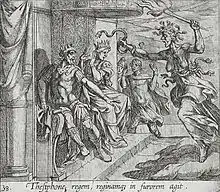Tisiphone
Tisiphone (Ancient Greek: Τισιφόνη), or Tilphousia, was one of the three Erinyes or Furies. Her sisters were Alecto and Megaera.[1] She and her sisters punished crimes of murder: parricide, fratricide and homicide.

In literature
In Book VI of Virgil's Aeneid, she is described as the guardian of the gates of Tartarus, "clothed in a blood-wet dress".[2]
In Book X of the Aeneid, she is described as "pale" and raging "among the warring thousands" during the battle between Mezentius and Aeneas's men.[3]
In Book IV of Ovid's Metamorphoses, she is described as a denizen of Dis who wears a dripping red robe and who has a serpent coiled around her waist. At the behest of Juno, Tisiphone drives Athamas and Ino mad with the breath of a serpent extracted from her hair and a poison made from froth from the mouth of Cerberus and Echidna's venom.[4]
Tisiphone has a prominent role in Statius' Thebaid, where she spurs on the war between Polynices and Eteocles at the behest of their father, Oedipus. One of her more gruesome feats in the epic is to drive the hero, Tydeus, to cannibalism. In a bizarrely pastoral scene, Tisiphone first appears in the epic lounging beside the Cocytus river in the underworld, letting her serpent locks lap at the sulfuric waters.[5]
According to one myth, she fell in love with a mortal, Cithaeron, but was spurned; in her anger she formed a poisonous snake from her hair, which bit and killed him.[6]
In Book I of Chaucer's Troilus and Criseyde, the narrator calls upon her to help him to write the tragedy properly.[7]
In Canto IX of Dante's Inferno, she appears with her sisters before the gates of Dis, threatening to unveil the Medusa.
In the David Weber space opera In Fury Born, Tisiphone appears as an ancient Greek spirit who is mind melded with a super soldier Alicia Devries and they along with a starship AI named Megaria save the universe from evil pirates.
Ships
HMS Tisiphone was a fireship of the Royal Navy launched in 1781 and sold for breaking up in 1816.[8]
Asteroid
Minor planet 466 Tisiphone is named after her.[9]
See also
References
- "Mythological Index". The Ovid Collection. University of Virginia Library.
- "Virgil: Aeneid VI (A.S.Kline's translation)". poetryintranslation.com. Retrieved 25 October 2015.
- "Virgil: Aeneid X (A.S.Kline's translation)". poetryintranslation.com. Retrieved 15 April 2018.
- Ovid, Metamorphoses Bk IV:464-511.
- Statius, Thebaid Bk I:88-91.
- Pseudo-Plutarch. De fluviis.
- Geoffrey Chaucer, "Troilus and Criseyde", Book I:5, in The Riverside Chaucer, 3rd Edition, ed. Larry D. Benson, Oxford University Press, 1988, p.473
- Winfield, Rif (2007). British Warships in the Age of Sail 1714–1792: Design, Construction, Careers and Fates. Seaforth. p. 378. ISBN 978-1844157006.
- "(466) Tisiphone". (466) Tisiphone In: Dictionary of Minor Planet Names. Springer. 2003. p. 52. doi:10.1007/978-3-540-29925-7_467. ISBN 978-3-540-29925-7.
External links
 Media related to Tisiphone (mythology) at Wikimedia Commons
Media related to Tisiphone (mythology) at Wikimedia Commons